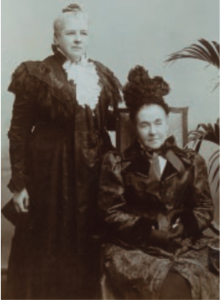Eleanor Grove
Eleanor Grove (1826 – 22 November 1905) was a British translator and educationist. She was the founding principal of College Hall in London that allowed women to live in Bloomsbury and attend the University of London. She and her life long partner, Rosa Morison, have a building named after them.
Eleanor Grove | |
|---|---|
 Rosa Morison and Eleanor Grove (seated) | |
| Born | 1826 |
| Died | 22 November 1905 Tavistock Place |
| Nationality | United Kingdom of Great Britain and Ireland |
| Partner(s) | Rosa Morison |
Life
Grove was born in Clapham in 1826. Her parents were Mary Blades and Thomas Grove, Her father was a dealer in fish and venison and he was a congregationalist. She had many siblings, one of whom was an elder brother, George, who became an engineer but is now known for Grove's Dictionary of Music and Musicians. Grove's parents left her well provided for and she was able to decide how she would spend her life.[1]
She worked as a governess in Germany and in Austria and she translated Wilhelm Meister's Apprenticeship by Johann Wolfgang von Goethe[1] and An Egyptian Princess by George Ebers.[2]
When a job was advertised at Queen's College, London for an assistant secretary, Grove was so qualified that she was given the job despite missing the interview. Her brother, George Grove, the engineer and musicologist, had told her of the position and he attended the interview on her behalf.[1] It was there that she met the linguist Rosa Morison[3] who had been employed as assistant secretary in 1872.
Grove was later promoted to Lady Resident. She oversaw the staff, guided the students and where necessary imposed discipline.[1]
Grove and Morison loved the German language and they had similar views on the education of women. In 1881 they lost confidence in the management of Queen's College, which they considered lax and inefficient. Moreover the college was failing to rise to the opportunity raised by the aspiring ambitions for women's education by the University of London.[3] The pair left their jobs and set out on a brief holiday travelling in Germany together. On their return, they approached the University of London with an offer to work for nothing.[1] Morison became Vice-Principal at the university's newly opened College Hall[4] and Grove was appointed Principal. Eleanor was able to use her connections to find a building for the college (and the two of them) at 1 Byng Place, Torrington Square.[1] College Hall opened at the former Coward College in 1882, initially with rooms for nine students; by 1884 there were seventeen students as other buildings were added.[5]
Morison was promoted in 1883 to the new post of "Lady Superintendent of Women Students".[4]
Death and legacy
Grove's poor health obliged her to retire in 1890 to a nearby house at 15 Tavistock Place, where she died of heart failure in 1905.[1] University College, London grants an annual scholarship in her name.[6] In 2018 created a new hall of residence that was named Eleanor Rosa Hall to commemorate the contribution of Rosa Morison and Eleanor Grove to women's education.[4] The new building has 33 floors and capacity for 500 students. The interior design is inspired by its namesakes.[7]
References
- "Grove, Eleanor (1826–1905), educationist". Oxford Dictionary of National Biography. doi:10.1093/ref:odnb/48596. Retrieved 26 July 2020.
- Ebers, Georg (2019). An Egyptian Princess — Complete. Good Press.
- "Morison, Rosa (1841–1912), educationist". Oxford Dictionary of National Biography. doi:10.1093/ref:odnb/48601. Retrieved 26 July 2020.
- "Rosa Morison". University of London. Retrieved 26 July 2020.
- "UCL Bloomsbury Project". www.ucl.ac.uk. Retrieved 26 July 2020.
- "Eleanor Grove Scholarships for Women Students". postgraduatefunding.com. Retrieved 1 July 2020.
- "First student residents move into Eleanor Rosa House in Stratford". UPP Ltd. 13 September 2019. Retrieved 26 July 2020.
Further reading
- Dyhouse, Carol (2016) [1995]. No Distinction Of Sex?: Women In British Universities, 1870-1939 (Reprinted ed.). Routledge. ISBN 978-1-13422-297-1.